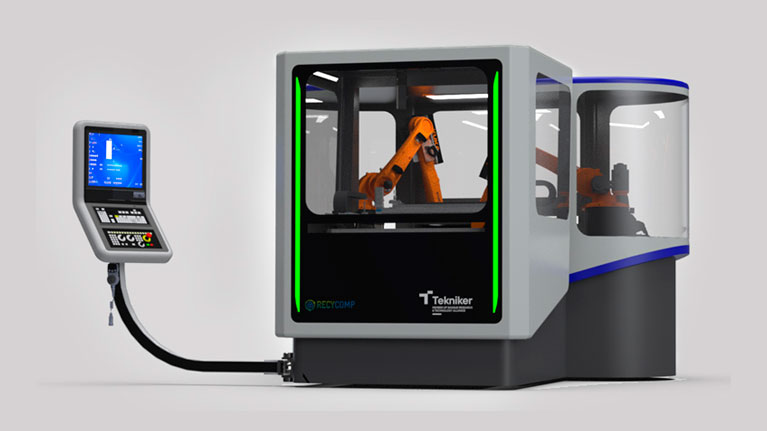More sustainability for the aeronautical sector
The Tekniker technology centre is currently leading the RECYCOMP project to develop a machine that will allow surplus materials resulting from industrial processes be used again. The initiative will also address the analysis and control of recycled materials required manufacture components for the aeronautical sector.

A number of policies focused on the circular economy, recycling and environmental concerns promoted by the European Union and the Basque Government are allowing the industry to move in the right. The implementation of economically profitable production resources and processes that allow materials to be used again must be given priority to further the demand for recycled materials in the market.
The RECYCOMP project, led by the Basque technology centre Tekniker, a member of the Basque Research and Technology Alliance (BRTA), intends to make further progress with regard to introducing sustainable production resources and processes specifically focused on surplus materials containing pre-impregnated unidirectional carbon (PREPREG) produced in automatic or manual rolling processes for the manufacture of components in sectors such as aeronautical business where surplus materials are either taken to landfills or incinerated and only give rise to environmental problems.
It has been estimated that this initiative, under the umbrella of the European Clean Sky 2 call, will finish towards mid 2023 and allow further progress to be made in terms of analysing and monitoring the behaviour of recycled materials to be used at a later stage to manufacture functional components for the aeronautical industry.
In order to so do, Tekniker will contribute its expertise associated with a number of technologies to design and build a machine that is able to recover and reuse PREPREG surplus materials. Said technologies include the development of special machinery, mechatronics, automation, robotics and artificial vision.
The technology centre will also perform mechanical testing to monitor how recycled materials behave in test specimens subjected to mechanical testing to compare their degree of resistance relative to the figures obtained with non-recycled materials. Eventually, it will become possible to use these materials to manufacture non-critical components such as internal parts for seats, overhead bins, etc.
Artificial vision, cutting and handling
Tekniker has set a number of specific goals to develop the RECYCOMP prototype and the technologies required to cover the different stages of a material recovery process.
Consequently, the machine will be equipped with an artificial vision subsystem to automatically identify the composite material and the orientation of its carbon fibres and incorporate a cutting subsystem to provide regularly shaped pieces. A manipulation subsystem will also be developed to pick up the material recovered from the aforementioned pieces.
Manufacturing processes involving composite materials in the aeronautical sector discard 10–40% of the original material during automatic and manual rolling processes. By reusing these materials for non-critical applications, it will be possible to reduce the amount of new materials required to manufacture them.
This would also indirectly cut down costs attributable to components manufactured with original materials as discards would be reduced.
“The option of being able to reuse PREPREG cuttings helps to minimise the amount of waste produced by rolling processes and their value increases because they can be used again to manufacture new components”, explains Oscar Gonzalo, a Tekniker researcher.
The aim of the RECYCOMP project is to have a prototype ready by September 2022 to be commissioned at the facilities of the manufacturer and Topic Manager Leonardo Aircraft Division in Naples (Italy).
Although mainly focused on producing non-critical components for the aeronautical sector, it will also be possible to use this recycling machine sectors: automotive, railways, shipbuilding, power or sport equipment.
This project has an impact on SDGs 9 - Industry, innovation and infrastructure and SDGs 12: Responsible production and consumption which reinforces the economic and environmental pillars of sustainable development and benefits society at large.
RECYCOMP project has received funding from the Clean Sky 2 Joint Undertaking under the European Union’s Horizon 2020 research and innovation programme under grant agreement No 886967.
